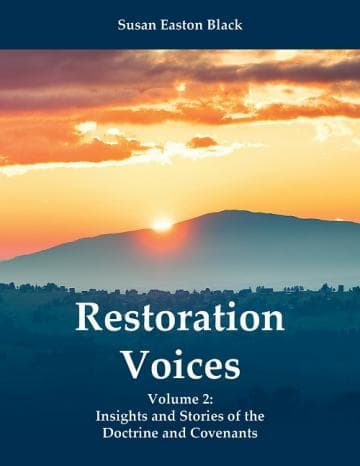Book
140 Chapters

D&C 56:5
Ezra Thayre and Thomas B. Marsh were one of twenty-eight pairs of missionaries called to attend a conference in Missouri (D&C 52:22). With Joseph Smith and other Church leaders making plans to leave Kirtland in June 1831 to attend the conference, Thomas B. Marsh was concerned. His missionary companion, Ezra Thayre, was “unable to start on his mission when [he] was ready” (D&C 56: Introduction). Thomas sought counsel from the Prophet Joseph Smith on the matter. Joseph inquired of the Lord and received a revelation telling him, “I, the Lord, command and revoke, as it seemeth me good; and all this to be answered upon the heads of the rebellious” (v. 5). In other words, Ezra Thayre had his agency to choose and to act for himself as to whether to accept the mission call. When Ezra chose not to serve the mission, the Lord revoked the command.
Agency is our God-given right. With it, we are “free to choose liberty and eternal life, through the great Mediator of all men, or to choose captivity and death, according to the captivity and power of the devil” (2 Nephi 2:27). Although free to choose our actions, we are not free to choose the consequences of our actions. Consequences are an unavoidable, natural result of choice (see Galatians 6:7; Revelation 22:12).
Elder Neil L. Andersen at the April 2011 general conference shared a humorous story that illustrates this point:
I once told the story of our four-year-old grandson giving his little brother a strong push. After consoling the crying child, my wife, Kathy, turned to the four-year-old and thoughtfully asked, “Why would you push your little brother?” He looked at his grandmother and responded, “Mimi, I’m sorry. I lost my CTR ring, and I cannot choose the right.”[1]
Choice and consequence are as complementary as agency and accountability. They cannot be separated. Elder Donald L. Hallstrom in his October 2007 general conference address spoke of the complementary nature of agency and accountability by sharing a family story:
When our oldest child (who is now a father of three and sits in this priesthood congregation this evening) was 11 years of age, he was given an assignment, along with the other sixth graders of his school, to submit his favorite family recipe. As its contribution to a large spring fair, the sixth grade was producing a cookbook that would be distributed throughout the community. When the teacher announced the project and a deadline of a week from Friday, our son Brett immediately concluded there was plenty of time later to get the job done and dismissed it from his mind. Early the next week, when the teacher reminded the students of the Friday deadline, Brett decided he could easily complete the required task on Thursday night and until then he could occupy himself with other more enjoyable matters.
On the appointed Friday morning, the teacher directed the students to pass their recipes to the front of the class. Brett’s procrastination had caused him to forget the assignment and be completely unprepared. Flustered, he turned to a fellow student seated nearby and confessed his problem. Trying to be helpful, the classmate said, “I brought an extra recipe. If you want, use one of mine.” Brett quickly grabbed the recipe, wrote his name on it, and turned it in, feeling he had escaped any consequences related to his lack of preparation.
One evening several weeks later, I arrived home from work to freshen up before going to my evening Church meetings. A few days prior, I had been called as a stake president after serving several years as a bishop. We were somewhat known in our community as members of the Church who tried to live the tenets of our religion. “There’s something you need to see,” my wife, Diane, said as I walked through the door. She handed me a bound book with a page marked. Glancing at the cover, titled Noelani School’s Favorites—1985, I turned to the identified page and read, “Hallstrom Family, Favorite Recipe—Bacardi Rum Cake.”
Elder Hallstrom concluded his remarks by sharing, “Many of us place ourselves in circumstances far more consequential than embarrassment because of our procrastination to become fully converted to the gospel of Jesus Christ.”[2]
[1] Neil L. Andersen, “Preparing the World for the Second Coming,” Ensign, May 2011.
[2] Donald L. Hallstrom, “Do It Now,” Ensign, November 2007.
Book
140 Chapters
Items in the BMC Archive are made publicly available for non-commercial, private use. Inclusion within the BMC Archive does not imply endorsement. Items do not represent the official views of The Church of Jesus Christ of Latter-day Saints or of Book of Mormon Central.